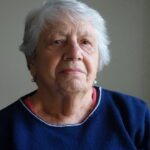
Yelizaveta Slabodetskaya, z"l (Russia)
I am Yelizaveta Slabodetskaya, born in Moscow in March 1931. When the war began in Russia, our family consisted of my parents, my older sister and me. My father, Naum Ehrlich, worked in a tool factory, and my mother, Klara Ehrlich, was a housewife. Prior to that she’d been a seamstress. My older sister’s name was Ida, and in those days I was called Lusya.
We lived in Moscow when the war began. At first, we children didn’t understand how awful things would get. We continued to play in the courtyards, and the little boys would get carried away with themselves when they played soldier games. We had our area where we built forts and those sorts of things. We just didn’t understand. Then the air raid sirens began to blare out, and the Germans began to bomb Moscow. We would run frightened to Kiev Train Station, in Moscow, and hide in the station to save ourselves. Of course, we still didn’t understand.
I don’t know how, but we did still go to school. My father was sent to the front with the Army, and my mother went back into her earlier profession as a seamstress making uniforms for the soldiers. We were finally told to gather our things and were taken to the Ryazan Region, where I still didn’t understand much of what was going on.[1]
I remember that we were in a beautiful place, a small village known as Lunino on the banks of the Oka River. We weren’t there long before they gathered us again to continue evacuating deeper into Russia. We rode for more than a week in a boxcar where they’d built a platform above. This is where the children slept, in two rows.
This was when I began to understand what was going on, during the evacuation. One day on the train, we all had to go out on the platform to have our hair shorn because we were filled with lice. We were hungry and dirty when we finally got to Perm Region, in Russia, which was the only rail line that was still working by then.[2] They took us straight from the train to the baths, and took our clothes from us so they could boil them.
We were taken to a village where a glass factory from Ukraine had been relocated. I remember this because we’d go around collecting the broken glass that had been thrown out. We lived in the orphanage and went to school, but there weren’t any notebooks for us to write in.
All this time my mother was in Moscow working as a seamstress. She found out where we were about a year later. At that point the Germans had made it almost to Moscow, and Moscow had announced that anyone willing to pay could leave the city and go wherever they wanted. Our mother found us. We moved out of the orphanage and into a house owned by a woman with a son and daughter, but continued to go to the same school.
The village put together home-made beds, and the three girls in our home slept in one of these beds. This was quite a convenience.
My mother didn’t work, but she did sewing for people. This kept us from starving. For breakfast we boiled water and had a small piece of bread and sugar, and at school they gave us bagels. That was a real prize. It was very hard on my mother. My sister was 17 by then, but there wasn’t a senior class in the village school so she had a break in her education until after we returned to Moscow, which we did in 1944.
Back in Moscow, we lived in the same communal building we’d lived in before the war. It was a small building, a two-story wooden building. There was a community kitchen and we got water outside the building. My father returned from the war in 1944 with a wounded arm.
After graduating from school I attended an engineering and economics institute in Moscow, and after I finished I worked as a civil engineer. Our engineering group built buildings all around the Moscow area.
My husband, Nikolay Slabodetsky, attended the same institute. We were married in 1953 and had two children. There was never a better man to enter my life than him, and I think of him day and night. He was a wonderful husband and father. He worked for the Ministry of Energy, and was one of the people who died because of the Chernobyl disaster.
[1] Ryazan Region is approximately 75 miles southeast of Moscow.
[2] Perm Region is in central Russia.
